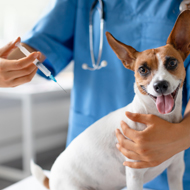AMR gene spreads between pets at UK animal hospital

Four isolates tested positive for the gene optrA and there was evidence of transmission between animals.
A gene that allows bacteria to become resistant to linezolid, a last resort human antibiotic, has been found in four pets at a UK veterinary hospital for the first time.
Scientists from Public Health England (PHE) said the discovery is “concerning” as transmission of this organism to owners carries the risk of spread to other bacteria, including Staphylococcus aureus, leading to hard-to-treat infections.
Linezolid is used to treat certain bacterial infections in humans, such as streptococci and MRSA, but it is not licensed for veterinary use in the UK.
Routine testing at the affected veterinary hospital revealed an Enterococcus faecalis isolate from a cat wound swab, which was referred to PHE. Scientists subsequently analysed three other E faecalis isolates from two cats and one dog from the same hospital, but different households.
Four isolates from three wound swabs and a cat rectal swab were found to be resistant to linezolid and gentamicin. All four isolates were also positive for optrA and there was evidence of transmission between animals. PHE said it is the first known report of optrA-positive enterococci isolated from UK pets.
The findings were presented at the European Congress of Clinical Microbiology & Infectious Diseases in Amsterdam (13-16 April).
Lead author Dr Katie Hopkins said veterinary practices must ensure adequate cleaning takes place to minimise transmission of resistant bacteria between companion animals and people. Standard protocols for managing colonised or infected animals should prevent transmission to veterinary staff, she added. Pet owners should also wash their hands after handling pets.
In the above case, further transmission was halted by cleaning and decontamination and there is no evidence that humans became infected.
Dr Hopkins added: “Our findings further the 'One-Health' view that antibiotic-resistant bacteria can be shared by animals and humans, although the direction of transfer is often difficult to prove.
“We currently do not know the prevalence of linezolid-resistant enterococci in companion animals and therefore a joint approach to monitoring emergence and dissemination of resistance mechanisms of public health importance is needed.”



 RUMA CA&E has extended the deadline for its online survey into vaccine availability.
RUMA CA&E has extended the deadline for its online survey into vaccine availability.